- Home
- Melissa de la Cruz
The Queen's Secret Page 4
The Queen's Secret Read online
Page 4
The scribe’s name is Daffran, and he’s lived in the castle all his life. Cal sees him at Small Council meetings, writing down proceedings in a looping hand, or in the courtyard, feeding the birds. The rest of Daffran’s days are spent in his small, high-ceilinged library in the tower, working on his chronicle of Montrice.
Daffran shuffles in Cal’s direction, giving him an uncertain smile.
“Morning.” Cal nods at him.
“Good morning, Holt,” the Chief Scribe says in a wavering voice, then clears his throat. “I wonder if I might trouble you, if you have a moment?”
“Is something wrong, sir?” Cal asks. Daffran rarely addresses him directly. He’s always suspected that the scribe is a little afraid of assassins.
“Perhaps—in private?”
“I’ll walk with you.” Cal’s glad for the opportunity to leave the recruits to their own pathetic devices for a few moments. He accompanies Daffran, at a frustratingly slow pace, back to the tall stone tower linked to the hall keep by a covered passage. On the lowest floor is the chapel, which Lilac visits every few days, and the vestry where her priest, Father Juniper, studies. The scribes’ library is two floors up. The young assassins jokingly call the tower Old Man’s Leap, because only elderly men live and work there. Even the junior scribes have white hair, or no hair at all.
Outside the main door Daffran pauses, as though he’d changed his mind about entering. Cal stands with him in the portico, puzzled. What is so important that the scribe sought him out? Is all this training of troops interfering with the bird feeding?
“I wonder,” says the scribe in a low voice, “if it’s better to speak out here, where none are too close to us, and the noise of this place will help keep our words secret.”
“Fine,” Cal replies, even more mystified. “Not inside the tower?”
Daffran shakes his head, his watery blue eyes darting from the tower to the courtyard and back.
“I trust no place,” he whispers, standing so close to Cal that his scent of beeswax and linseed oil is overpowering. “And no man but you, Chief Assassin.”
“If this is about the stories of what happened in Stur . . . ,” Cal begins, but Daffran shakes his head again.
“It’s about what is happening here, in Mont, within these very walls.” His whisper is barely audible. Cal has to bend down to hear him. “I have seen things.”
“What things?”
“The shape of a man.”
“One man?” Cal hopes this isn’t like the story of Lilac’s face in the sky. He’s bored with people reading things into cloud formations and lightning bolts.
“A hooded man in dark gray robes. I saw him on the stairs outside my library, when I had left the door open. Last night. I was waiting for my supper, you see, which I always take alone. Just a little wine, because I find it helps to relax me after long hours writing.”
“The man you saw?” Cal prompts.
“Just a flash, as he passed my door. I could not see his face, so I can’t be sure if he wore the black mask of the Aphrasians. But he looked to me to be one of the dark monks. There and gone, in an instant.”
“A dark monk?” Cal is whispering too now. “But you didn’t see his face. Are you sure it wasn’t simply another inhabitant of the tower? Father Juniper, say.”
“Father Juniper wears white,” Daffran replies. “My junior scribes wear the same blue robes as mine. None of us are in possession of dark cloaks or robes.”
“Perhaps a servant delivering food?”
“Gray robes are not permitted in the castle,” Daffran hisses. “They are associated with the Aphrasians. Apologies, Holt, for my tone. You are new here, and do not know our ways. No servant of the King of Montrice may wear a gray or black cloak. Some ladies of the court may dress themselves in black, if that is their wont. I understand it is the fashion, perhaps, of our times, though I don’t care for it myself. But I am not one to criticize any member of the king’s retinue—please, do not think that for a moment.”
He blusters on, and Cal realizes that he’s talking about the king’s current favorite, Lady Cecilia, who likes to wear black gowns and has been known to wear a black-feathered eye mask to balls and other revelries. Cal has to interrupt to get Daffran back to the point.
“What did you do when you saw this—figure?”
Daffran doesn’t reply at once. Cal wonders if he just sat trembling in his chair, too afraid to move.
“The page arrived with my supper, and I asked him if anyone had passed him on the stairs. He said no. After he left, I bolted the door.”
“You said to me earlier that you saw ‘things,’ not just one thing. Have you had any other sightings of this kind?”
“Early this morning, at first light, I rose to feed the birds.” Daffran’s voice is trembling. He seems genuinely afraid. “But when I descended the stairs, I saw the dark figure again, slipping out this very door.”
Daffran points to the iron-studded door to the tower.
“You followed him?” Cal asks, knowing the answer. Daffran hangs his head.
“I had not the courage, Chief Assassin. All my life I have lived in fear of the gray monks, and I doubt I would emerge the victor from any confrontation with one. I wondered, too, at the testimony of my own eyes. I am old. Perhaps I see things that are not there. I don’t know. But if anyone should be told of this, it’s you. I know you have fought the Aphrasians and lived to tell the tale.”
“Thank you, Chief Scribe,” Cal says, patting Daffran’s rounded back. The old man is evidently rattled by what he’s seen—or thinks he’s seen. “I will station guards at the tower’s door, and they will conduct a thorough search of the building at sundown and sunup every day.”
“I would appreciate that. Thank you. And please, Holt?”
“Yes?” Cal bends even lower to hear Daffran’s whisper.
“Rest assured that I will not share this story with anyone unless you tell me to do so. There is enough conjecture and fear in the city as it is. We can say the guards are there to protect our ink and vellum from a thief, perhaps. They are costly items, you know.”
Cal agrees with this plan and says farewell to the Chief Scribe; the old man wobbles back into the tower, barely strong enough to pull the door open.
The Small Council is scheduled to meet tomorrow, and Cal will raise the issue there. Lord Burley alarms easily and may want more guards at every door, not to mention all-night vigils on every floor of the tower. The Duke of Auvigne will scoff, no doubt, and cast aspersions on the elderly scribe’s sanity. He’s been rude before about the languid pace of Daffran’s writing, and has suggested more than once that one of the younger junior scribes—one who still has his hearing and doesn’t wheeze when he climbs the stairs—should take Daffran’s role at the Small Council.
If the Small Council agrees, Cal will confide in the captain of the guard, and a thorough search of the castle can begin. This place is a small city, with many underground stories, cellars, and tunnels, not to mention the catacombs. If the Aphrasians have infiltrated Castle Mont, there are many, many places to hide. But why would they seek out the tower, which has no underground access, and a portico leading to its only door? It’s the easiest place to be seen and unmasked, not to mention trapped.
On the far side of the courtyard, the captain of the guard is waving. He needs Cal to resume his duties. The first contingent sets off for the north in two days, and not a man among them is ready to fight.
Chapter Five
Lilac
In my chamber I hurl my jerkin and arm guards to the floor and dismiss all my attendants, apart from Lady Marguerite. She drops to her knees to unlace my boots, but I practically kick her away.
“That Guild fighter,” I say. “The one training me today. Who is she? Can you find out?”
Marguerite stares up at me, eyes wide. “The girl from the mountains?” she asks. “I believe she is called Rhema.”
“I know that,” I say, a surge of irritation pushing out my words. “I mean, why has she been taken on as an assassin? She could be anyone. She could be here to murder me.”
“Oh no, Your Majesty!” Lady Marguerite looks horrified. “She is highly regarded. I’m told that she was personally selected by Caledon Holt to join his elite group.”
I say nothing. I just stand with my back to the window while Lady Marguerite unlaces my boots and eases out my stockinged feet, one by one. Really, I don’t trust myself to say a word.
“Also, ma’am,” Lady Marguerite adds, her voice hesitant, “there was a rider at sunup with some missives taken straight to His Majesty the King.”
“Missives? From where?” It’s ridiculous that I have to rely on my ladies for such intelligence.
“Stavin, I believe, ma’am. And another report from the northern region where the terrible . . . terrible . . .”
“Yes, yes,” I say. “Very well. Please leave me. I wish to write a letter.”
Lady Marguerite bows and leaves the room.
My ladies return. “Fetch me writing materials,” I order. There’s more fluttering, the ladies competing to fetch the inkpot and sharpen the quill, one unrolling a sheet of vellum that’s the same ivory as bones. One lady sets a dish of scented lilac wax next to a candle, ready for the seal of my heavy gold ring. My desk sits facing the window, with a view of the castle’s gray stones and soaring turrets and the gloomy winter sky. Lady Marguerite lurks nearby like an owl, blinking at me.
“Please don’t think me impertinent,” she says, “but I wonder—is this a letter that will leave the castle grounds? Or is it something that will be delivered to His Majesty
or one of your advisors on the Small Council?”
“I don’t see why the destination of this letter should concern you, Lady Marguerite,” I tell her. “I have everything I need here, and I’ll summon a page when I’ve finished my correspondence. You are dismissed.”
“Of course, ma’am.” Another curtsy. She’s facing the floor, her veil drooping onto the flagstones, when she speaks again. “I’m just concerned for your well-being. Deeply concerned.”
The fire crackles and spits. I tap a sharpened quill against the wood of the desk. It sounds like the beak of a woodpecker, drilling into a tree.
“I don’t understand,” I tell her, sounding as impatient as I feel. “What is the reason for this concern?”
“I’m just thinking of your safety, ma’am.”
“Well, at this moment I am simply writing to my mother, as I do every week. Unless one of you has poisoned the ink, I don’t see why this letter compromises my safety.”
“Of course. I just fear that since . . . the incident.” Lady Marguerite peeks up at me. “When you rode out with the king. I fear that not all support you as they should. I would not wish the letter to fall into . . . enemy hands, as it were.”
“The enemy, whoever they may be, would be very bored with this letter,” I tell her. “From daughter to mother, with no matters of state discussed or anything of import. Unlike, I presume, the missive that arrived this morning and was sent directly to His Majesty.”
“Your Majesty.” She backs out of the room, almost stumbling on the hem of her dress. I wait until the heavy door clangs behind her before I turn back to my desk and the blank sheet.
I can’t write a word. I’m seething. Apparently I’m the queen of this realm, but important letters arrive for Hansen’s perusal only. If something is happening in Stavin, it should be considered by both of us. And now I can’t even sit down to write a letter without being interrogated about its destination. What does Lady Marguerite think—that I’m writing a love letter to the Chief Assassin? Who is this “enemy” who plans to pounce on a letter to my mother?
Maybe she knows more, sees more, than she reveals to me. Perhaps I’m wrong to discount the opposition to me in Montrice. I must be careful about what I write, I suppose, and keep in mind that anything I send to my mother may be intercepted and read—or misread—and used against me.
This is so frustrating. I write to my mother on this day every week, and now I feel as though I can’t write a word. Still, she’ll be expecting something from me, and I mustn’t delay. It’s a difficult journey for the messenger, for Renovia is a place of secrets and deep hollows, of misty moors and damp gullies. Even expert travelers can find themselves disoriented and lost in its miles of dense scrub and birch forests.
I dip the quill into black ink and start to write—benign drivel, really. Even if I had no fear of the letter being intercepted, I wouldn’t want to tell my mother about the ride with Hansen when the people expressed their displeasure. Where I was booed, and villagers looked at me with horror and disgust, as though I were a witch. I won’t endorse the story about the lilac ice in the village of Stur by committing it to vellum. It’s unlikely to be true, and even if it were, the sight is evidence of black magic, not malfeasance on my part. If this letter is intercepted, or falls into the wrong hands in any way, nothing in it must suggest I’m afraid.
So I write to her of the new marble in the floor of my chapel and the bustle of troops training in the courtyard below my window. The king, I tell her, is in his usual good health. I assume that this is true, because I would surely have heard by now if he was ailing in any way. Lady Marguerite, at the very least, seems to know the gossip.
Outside my window a crow caws, and even though I’m wrapped in a shawl spun from fine Argonian wool, I shiver. The sun is weak and all the warmth seems to be leaking from the day. There’s something about the castle here in this rocky city of Mont that makes it feel like a prison. When songbirds of summer are gone, we’re left with nothing but grim crows, the same color as the ink in my pot. They swoop onto my windowsill and glare at me with beady eyes, as though they’re my jailers. The sound of them sets my nerves on edge. Some days it feels like we have more crows in the castle than soldiers patrolling the parapets or rats scurrying in the cellars. I’m tempted to pluck my bow from the wall where it hangs near the window and scatter a few well-aimed arrows across the courtyard. No one would miss those crows.
And I still never miss a shot.
Writing this letter reminds me of how much I miss my mother and her wise counsel. I ask her if she’s seen my aunts, Moriah and Mesha. I trust their wisdom and instincts more than anyone’s—perhaps even more than Cal’s. They know the world of Deia, our great and ancient goddess, and trained me from childhood to be present and alert in the natural world—in forests and rivers, in mountain caves and treetops and thickets. Look and look and look again, Moriah would tell me. Then close your eyes and listen.
If only we could travel together to the northern region of Montrice, to investigate and speak to the people there. The best way to banish mistrust of me, I believe, is to meet people face-to-face, and let them see that I’m not a monster.
My aunts raised me to be a Guild member, not to live some kind of useless, cosseted life. They brought me up to fight and to respect the power and danger of magic. The more I think about this, the more I’m convinced we need to go north, to stand in the place where magic hijacked nature and brought terrible suffering to the people there. But how can I trust this to ink and vellum?
The doors to my chamber burst open and I’m out of my chair, quill brandished like a knife. If I have to, I can take out an eye with its needle-sharp nib.
A man stands before me, out of breath and startled to see me holding a weapon at his throat.
It’s Hansen—my husband, the king.
Chapter Six
Lilac
“Put that thing down!” Hansen’s handsome face is pale and he is visibly irritated after being startled. The pages close the doors behind him and we’re alone. “I’m not here to attack you.”
“Then can’t you knock like a normal person?” I throw the quill onto the table.
“I’m not a normal person. I’m the king.”
“And I’m the queen, in case you’d forgotten.”
“Well. About that.” Hansen starts pacing in front of the fire. For someone who’s such an avid sportsman—truly happy only when he’s riding to hunt or galloping in a jousting tournament—he wears the most elaborate and fussy clothes. Hansen has more lace in his wardrobe than all the ladies of the castle combined. Today his long robe isn’t just edged with ermine; it’s embroidered with gold thread. I suspect he takes longer to dress than I do.
“Well,” he says again.
“What? Is something wrong?” Hansen never visits me in my apartments. I think the last time he was here was to throw something out the window as a joke, pelting one of his idiotic courtiers with a dead pigeon or squirrel carcass. Hilarious.
“Not wrong exactly.” Hansen stops pacing and stands, hands on hips, blocking the heat of the fireplace. His fair skin is red, either with heat or embarrassment. “But something we have to do.”
“Travel north?” I say too quickly. Perhaps my aunts could meet us there. It’s as though Hansen, for once, had read my mind.
“Travel—what? No. We have to stay here. Don’t you remember what just happened, only a short ride from the city walls? The people hate us. We got married, they loved us, and now they’ve turned on us.”
“I think that’s an exaggeration.”
“Do you?” Hansen shakes his head, the expression on his face incredulous. “You have a short memory. All this business down south, in that remote village with the name I forget—”

 Gates of Paradise
Gates of Paradise Someone to Love
Someone to Love Pride and Prejudice and Mistletoe
Pride and Prejudice and Mistletoe Serpent's Kiss
Serpent's Kiss The Au Pairs
The Au Pairs Wolf Pact
Wolf Pact Witches 101: A Witches of East End Primer
Witches 101: A Witches of East End Primer Jealous?
Jealous?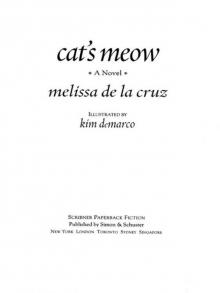 Cat's Meow
Cat's Meow Misguided Angel
Misguided Angel Birthday Vicious
Birthday Vicious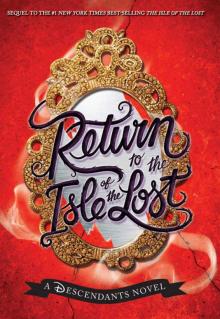 Return to the Isle of the Lost
Return to the Isle of the Lost Rise of the Isle of the Lost
Rise of the Isle of the Lost Angels on Sunset Boulevard
Angels on Sunset Boulevard Double Eclipse
Double Eclipse Blue Bloods
Blue Bloods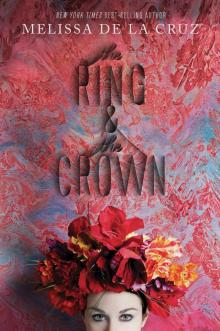 The Ring and the Crown
The Ring and the Crown The Ashleys
The Ashleys Les vampires de Manhattan
Les vampires de Manhattan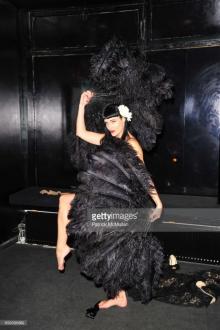 The Van Alen Legacy
The Van Alen Legacy Sun-Kissed
Sun-Kissed The Isle of the Lost
The Isle of the Lost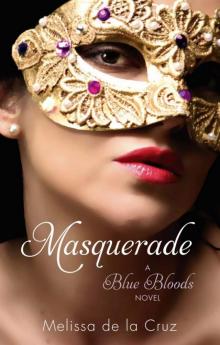 Masquerade
Masquerade Witches of East End
Witches of East End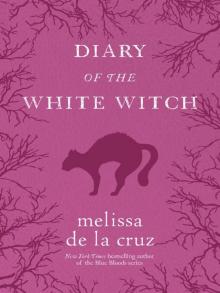 Diary of the White Witch
Diary of the White Witch Crazy Hot
Crazy Hot Lost in Time
Lost in Time White Nights: A Vampires of Manhattan Novel
White Nights: A Vampires of Manhattan Novel Revelations
Revelations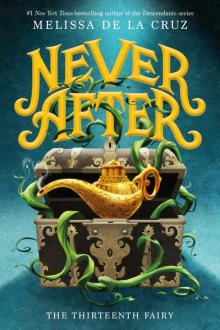 The Thirteenth Fairy
The Thirteenth Fairy The Birthday Girl
The Birthday Girl Lip Gloss Jungle
Lip Gloss Jungle Fresh Off the Boat
Fresh Off the Boat Something in Between
Something in Between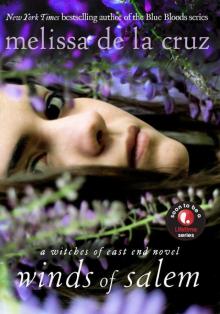 Winds of Salem
Winds of Salem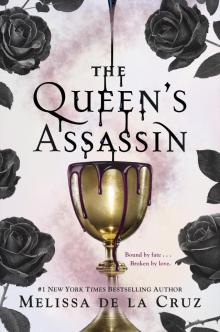 The Queen's Assassin
The Queen's Assassin Love & War
Love & War Social Order
Social Order Skinny Dipping
Skinny Dipping 29 Dates
29 Dates Popularity Takeover
Popularity Takeover Escape from the Isle of the Lost
Escape from the Isle of the Lost Beach Lane
Beach Lane Bloody Valentine
Bloody Valentine All for One
All for One Wolf Pact: A Wolf Pact Novel
Wolf Pact: A Wolf Pact Novel The au pairs skinny-dipping
The au pairs skinny-dipping Lip Gloss Jungle (Ashleys)
Lip Gloss Jungle (Ashleys) Crazy Hot (Au Pairs)
Crazy Hot (Au Pairs) Because I Was a Girl
Because I Was a Girl Blue Bloods 6 - Lost in Time
Blue Bloods 6 - Lost in Time Sun-kissed (Au Pairs, The)
Sun-kissed (Au Pairs, The) Bloody Valentine bb-6
Bloody Valentine bb-6 Golden
Golden Lost in Time_A Blue Bloods Novella
Lost in Time_A Blue Bloods Novella Alex and Eliza--A Love Story
Alex and Eliza--A Love Story Blue Bloods: Keys to the Repository
Blue Bloods: Keys to the Repository Birthday Vicious (The Ashleys, Book 3)
Birthday Vicious (The Ashleys, Book 3)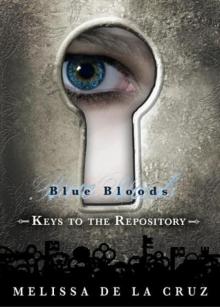 Keys to the Repository
Keys to the Repository Lost In Time (Blue Bloods Novel)
Lost In Time (Blue Bloods Novel) Stolen
Stolen Girls Who Like Boys Who Like Boys
Girls Who Like Boys Who Like Boys the au pairs crazy hot
the au pairs crazy hot Blue Bloods bb-1
Blue Bloods bb-1 Witches 101
Witches 101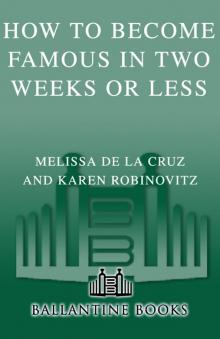 How to Become Famous in Two Weeks or Less
How to Become Famous in Two Weeks or Less Frozen hod-1
Frozen hod-1 Jealous? (The Ashleys, Book 2)
Jealous? (The Ashleys, Book 2) Misguided Angel (Blue Bloods)
Misguided Angel (Blue Bloods)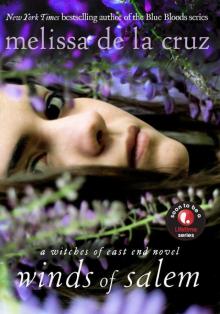 Winds of Salem: A Witches of East End Novel
Winds of Salem: A Witches of East End Novel The Gates of Paradise
The Gates of Paradise Beach Lane Collection
Beach Lane Collection Wolf Pact, The Complete Saga
Wolf Pact, The Complete Saga Gates of Paradise, The (Blue Bloods Novel)
Gates of Paradise, The (Blue Bloods Novel) Vampires of Manhattan
Vampires of Manhattan Isle of the Lost
Isle of the Lost Love & War_An Alex & Eliza Story
Love & War_An Alex & Eliza Story The Ashley Project
The Ashley Project Love & War--An Alex & Eliza Story
Love & War--An Alex & Eliza Story